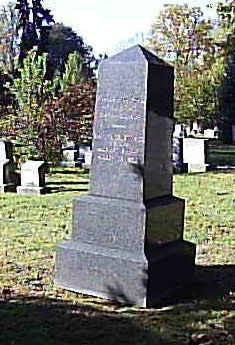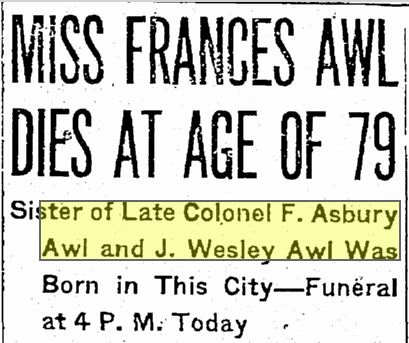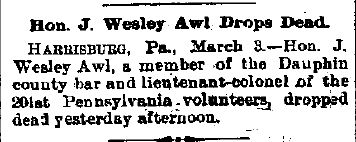Brothers Who Were Colonels – Francis Asbury Awl and John Wesley Awl
Posted By Norman Gasbarro on February 6, 2013
The announcement of the death of Miss Frances Awl at the age of 79 in the Harrisburg Patriot, 19 September 1921, provided information to connect two men of the surname “Awl” to each other as brothers. Colonel F. Asbury Awl and Colonel J. Wesley Awl were both Civil War veterans from Dauphin County. The obituary of Frances “Fannie” Awl stated that she was the daughter of the late Jacob M. Awl and Fanny [Horning] Awl. She was a native of Harrisburg and for many years was a member of the Grace Methodist Church. Preceding her in death were her brothers, Col. F. Asbury Awl and Col J. Wesley Awl and she was survived by two nephews, Major Frank A. Awl, an army officer stationed at Washington, and J. Wesley Awl, also of Washington.
Francis Asbury Awl is profiled in the Commemorative Biographical Encyclopedia of Dauphin County, page 258:
Francis Asbury Awl, son of John Michael Awl, was born at Harrisburg, 8 April 1837, where he resides. At the beginning of the Civil War in 1861 served in the three months’ service as adjutant of the Eleventh Regiment, Pennsylvania Volunteers [11th Pennsylvania Infantry]. In 1862 [he] raised for the nine months’ service, Company A of the One Hundred and Twenty-seventh Regiment, Pennsylvania Volunteers [127th Pennsylvania Infantry], and participated in the Fredericksburg Campaign. In 1864 he assisted in organizing the Two Hundred and First Regiment, Pennsylvania Volunteers [201st Pennsylvania Infantry], of which he was commissioned Colonel and served in that capacity until mustered out at the close of the war. He was a clerk in the Harrisburg National Bank prior the war; subsequently cashier of the banking house of Jay Cooke & Co., in New York, for a period of seven years; was a trustee for twelve years of the Pennsylvania State Lunatic Hospital and secretary of the board; and from 1891 to 1896 deputy superintendent of banking. Colonel Awl married, 5 June 1872, Mary Elizabeth Thompson, born 9 August 1847, in New York City. They have two sons, Jay Wesley Awl and Francis Asbury Awl.
A brief sketch of the life of John Wesley Awl is found on page 259 of the Commemorative Biographical Encyclopedia of Dauphin County:
John Wesley Awl, was born at Harrisburg, on 21 November [1832], and died there on 2 March 1894; was educated at Dickinson College, read law with F. K. Boas, Esq., and admitted to the bar in 1856. During the war for the Union he entered the service in 1862 as Captain in the One Hundred and Twenty-seventh Regiment, Pennsylvania Volunteers [127th Pennsylvania Infantry]. Upon the organization of the Two Hundred and First, Pennsylvania Volunteers [201st Pennsylvania Infantry], he was commissioned Lieutenant Colonel; in May 1865, was appointed Commandant of the “Soldier’s Rest” at Alexandria, Virginia; mustered out with his regiment 21 June 1865. Upon the organization of the National Guard of Pennsylvania he was Adjutant of the Fifth Division, and subsequently Adjutant of the Third Brigade; as an attorney he was careful, methodical and trustworthy; as a military officer he was highly regarded by his fellow-officers and greatly loved by his men; a life-long member of the church of his father, he was a faithful official. He was unmarried.
One of the confusing factors in tying the two Awl men together was the birth year error in the biographical sketch of John Wesley Awl – which stated that he was born in 1852 instead of 1832. This would have made it impossible for him to have served in the Civil War as he would have been only ten at the time he first entered the service. The other interesting part of the John Wesley Awl sketch is that his parents’ names were not provided and there was no mention that his brother was F. Asbury Awl. Initially, it was thought that this latter sketch might be for the son of F. Asbury Awl, “Jay Wesley Awl.” In researching the two Civil War veterans, it quickly became evident that they were brothers, but no corroborative evidence was found until the obituary of the sister was located.
The two men had similar military careers.
Colonel F. Asbury Awl enlisted on 24 April 1861 as a 1st Lieutenant in Company D of the 11th Pennsylvania Infantry at Williamsport, Lycoming County, Pennsylvania, and was mustered into service on 24 April 1861 at Harrisburg. Just after joining this regiment, he was promoted to the headquarters staff as Adjutant on 26 April 1861. According to the Union Army, Volume I, “five of the… companies were recruited on the West Branch of the Susquehanna, three on the East Branch, and two in Westmoreland county. A band of music, comprising sixteen pieces, under the leadership of Daniel Repass, was attached to the regiment….” After three months, the regiment was ordered back to Harrisburg, where it was discharged on 31 July 1861.
Meanwhile, J. Wesley Awl had joined the 1st Pennsylvania Infantry, Company E, as a 2nd Lieutenant, on 18 April 1861. This regiment “consisted of companies lettered, recruited, and mustered into service…. An excellent band of music, from Lancaster City, numbering sixteen pieces, under the leadership of Daniel Clemens, was also attached to the regiment.” After its three months service, it was mustered out at Harrisburg on 27 July 1861.
Then, as the 127th Pennsylvania Infantry was formed in August 1862, both men signed up at Harrisburg and began serving there, each as Captain of one of the companies. F. Asbury Awl was Captain of Company A and J. Wesley Awl was Captain of Company B. This regiment had in its ranks about 50 men who have now been identified as having some connection to the Lykens Valley area and served until it was discharged in May 1863, prior to the Gettysburg Campaign.
Neither man served in a Pennsylvania regiment until the 201st Pennsylvania Infantry was formed in August 1864. F. Asbury Awl was commissioned as Colonel of this regiment and his older brother, J. Wesley Awl, as Lieutenant Colonel. The 201st Pennsylvania Infantry contained more than 20 men who have been connected to the Lykens Valley area. The regiment was discharged on 21 June 1865 at Harrisburg.
After the war, the paths of the two men seemed to go separate ways. In addition to the biographical items that have already been stated above, the following should be of interest to those doing further research on the Awl brothers:
In 1867, F. Asbury Awl led an unsuccessful campaign to deny Harrisburg’s African Americans the right to vote. A copy of a petition was placed in the Patriot which listed the names of the signers, all former Civil War veterans.
In 1891, F. Asbury Awl, while serving on the board of the State Lunatic Asylum at Harrisburg, a scandal occurred regarding the treatment of the inmates, and the director resigned. An investigation was conducted and F. Asbury Awl was in the center of the politics which involved the governor, an appointed investigative group, and several doctors. The final conclusion was that there was no wrongdoing, despite the appalling conditions that were discovered.
In 1902, F. Asbury Awl went to Fort Leavenworth, Kansas, to visit his son Frank Awl, who was stationed there following his return from assignment in Manila, the Philippines. The next year F. Asbury Awl and wife went to New York for Frank’s wedding to Sadie M. Steinwender.
In February 1904, the Patriot reported that F. Asbury Awl had an attack of chills, and in mid-March 1904, the nature of his illness, cancer of the liver, was disclosed. On 25 March 1904, Colonel F. Asbury Awl died. The obituary noted the following:
For many years Colonel Awl was connected with the Old People’s Gas and Gaseous Fuel Company, and was associated with many other local business enterprises. He was also secretary and treasurer of the State Lunatic Asylum and a trustee of Grace Methodist Church….
Colonel Awl had suffered from cancer of the liver and a gall duct. He was forced to take to his bed on 1 January, although his illness at that time was not considered alarming….

Colonel F. Asbury Awl is buried in the Harrisburg Cemetery.
In 1886, the Philadelphia Record presented an investigative report that exposed horrible conditions at the Mt. Joy Orphans’ School. J. Wesley Awl and the governor of Pennsylvania were part of a delegation to investigate the report and found that all of what was written in the Record was true. The New York Times reported on 6 March 1886:
SOLDIERS’ ORPHANS ABUSED
HOW THE SONS OF HEROES ARE TREATED IN PENNSYLVANIA
HARRISBURG, Pennsylvania, 5 March 1886 — Today Gov. Pattison, Attorney-General Cassidy, Co. J. Wesley Awl, of this city, and a stenographer visited the Soldiers’ Orphans’ School at Mount Joy, Lancaster County, to investigate charges of neglect and mismanagement, and found a condition of affairs which fully justified the recent charges in the Philadelphia Record.
They found the children huddled together in inadequate, ill-ventilated dormitories, the beds and bedding unclean and foul of smell. Their clothing was insufficient, some of the boys wearing “cast offs.” None of them were provided with underclothing and all wore clothing of the same weight as that worn in summer…. The effect of poor light and indifferent care was found in sore eyes, many boys being thus afflicted. One of the boys dispenses medicine in the infirmary…. In the boys’ lavatory four towels did duty for 184 boys, or 46 boys to one towel. In the boys’ bathroom, a place about 10 feet square, in a bathtub about 18 inches wide and five feet long, 8 boys were allowed at a time, while ten towels were allowed to the 184 bathers….
The investigation concluded that a syndicate of men had pilfered outrageous sums of money from the institution when the money was supposed to be spent on the care of the orphans. The difference in this case and that of the State Lunatic Asylum, was that J. Wesley Awl had no supervisory authority over the Orphans’ School and was being asked to participate in the investigation as a respected attorney and as Adjutant of the Pennsylvania National Guard, whereas his brother, F. Asbury Awl, was a member of the board of the institution where the abuses were taking place.
J. Wesley Awl dropped dead at his desk in Harrisburg on 2 March 1894, the same day that Confederate General Jubal Early died. Due to his leadership position in the Pennsylvania National Guard, J. Wesley Awl‘s obituary was reported in newspapers throughout the state. His place of burial is not known at this time.
Additional information is sought on J. Wesley Awl and F. Asbury Awl, particularly pictures and stories as they relate to their military experiences in the Civil War. Civil War Research Project file numbers for the collection of this material are as follows: Francis Asbury Awl [File: CW#A035.2] and John Wesley Awl [File: CW#A035.3].
News clippings are from on-line resources of the Free Library of Philadelphia as well as the newspaper resources found on Ancestry.com.
 ;
;




I have a possible photo of Colonel Awl and I am looking for a corroborating image. Would you have one by any chance? thanks Steve